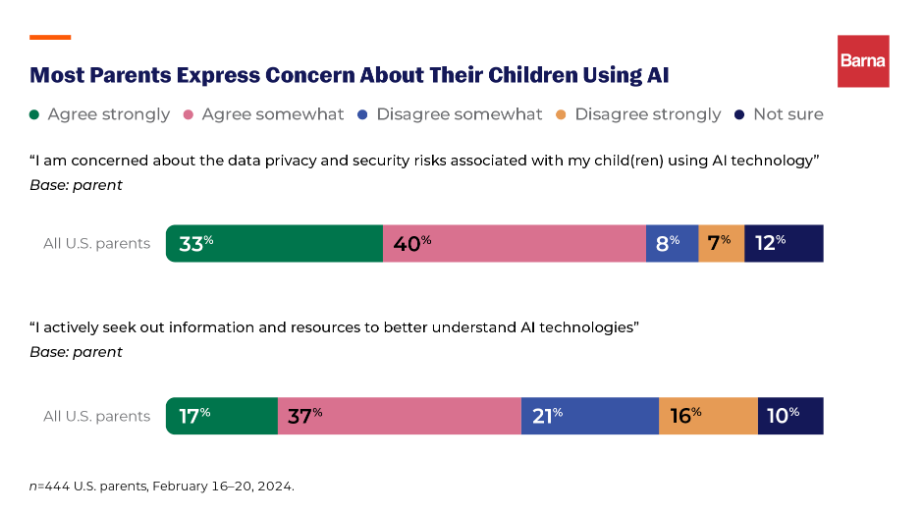
AI’s Influence on Children – Christian Viewpoints
After launching OpenAI’s technology to the public, one million users adopted AI (artificial intelligence) into mainstream living in just five days. Today, office workers leverage AI to complete mundane tasks in seconds, while marketing professionals create stunning designs to name a few positive outcomes.
While improving work productivity is a tremendous advantage, what is the downside to AI’s influence on children’s lives? Parents express their concerns.
In a recent survey by Barna Group, parents stated, “Parenting has never been harder than it is now—and the number-one reason is technology.” The study also reveals, “Nearly three in four parents (72%) are concerned about AI’s impact on children and teens.”
Key Concerns About AI’s Influence on Children:
- Data privacy and security risks.
- Ethical implications for plagiarism and access to immoral information.
- Decreasing human interaction and effects on social development.
- Increasing isolation and effects on mental health.
- Reducing creativity, critical thinking, and problem-solving skills.
- Targeting kids with a flurry of selling messages. (I.e. YouTube Kids)
- Widening the socio-economic “digital divide.”
Despite parental anxiety over AI, the Barna study reports that only 17% of U.S. parents are learning more about AI technologies. It’s understandable, given the complexities involved.

Christian Leaders Respond to AI

Many top Christian leaders support these concerns. In 2019, a group of 60 Christian leaders addressed AI in an official statement, Artificial Intelligence: An Evangelical Statement of Principles. Although the document aims to guide the Christian church regarding AI, the 12 articles with scripture references address the concerns listed above.
The authors emphasize the importance of understanding artificial intelligence and insist on using AI with dignity and worth as people being created in the image of God.
The leaders offer encouragement by stating, “Christians must not fear the future or any technological development because we know that God is, above all, sovereign over history and that nothing will ever supplant the image of God in which human beings are created.”
Joe Carter, a writer for The Gospel Coalition, provides a comprehensive overview of AI from a Christian perspective in his article, The FAQs: What Christians Should Know About Artificial Intelligence. On the topic of how Christians should think about AI, Joe Carter says, “Because AI will affect so many areas of life, Christians need to be prepared to maximize the benefits of such technology, take the lead on the question of machine morality, and help to limit and eliminate the possible dangers.”
Demystify AI Assumptions & Take Charge
Influence over AI government regulations might not be an option while parents taking control of their environment is an option. Whether it’s the Internet, social media, or AI, being informed about the potential risks and applying a strategy to safeguard our children is crucial. There are tools and techniques for monitoring AI usage through governance and parental controls, like any new technology.
Tips for Safeguarding Children Using AI (and all tech)
- Use AI together: Create a fun project that uses AI and discuss the output. Approaching new technology disarms preconceived fears and embraces the application as a family activity.
- Establish a family tech-free zone and media plan: Establish rules and time limits for daily digital consumption. Replace AI or tech-time with fun activities, preferably with no form of media.
- Encourage open family discussions about AI: Inquire about new areas of learning, and fun discoveries, along with negative online experiences. Foster a safe environment for kids to share openly about their digital world interactions.
- Manage access: Like social media, apps, or video game accounts, monitor access to AI tools and set parental controls and privacy settings at the highest security level.
- Smartphone Consent: Strongly consider smartphone access for children and teens. There are many alternatives to smartphones to enable access to phone calls and text messages.
- Hire an expert: Tech is complicated. Take a class or leverage an expert to set up parental controls and practices to decrease potential risks.
A Word from Experience
As a former Fortune 500 Company CIO and cyber-security leader, I have firsthand knowledge of the ambiguity of AI and technology. I get it. Expecting to grasp the details or inner workings of AI can lead to overwhelming feelings of fear and defeat.
With your child’s technology safety, become a digital ninja by managing their access. With AI, I encourage you to keep it simple by maintaining a big-picture perspective. Educate yourself by becoming a user of an AI application. There are many free versions. Experience the simplicity of the interface while accessing supercharged technical capabilities. Knowledge is powerful.
AI, when used responsibly, is a valuable tool for learning and advancing education. It inspires creativity for kids to express their ideas in new ways. AI offers new methods for young minds to be more interactive, explore a broader world, and enrich their lives.
Recommended Resources:
https://cace.org/the-role-of-ai-in-enhancing-christian-education/


